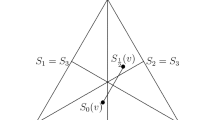Abstract
A social choice rule aggregates the preferences of a group of individuals over a set of alternatives into a collective choice. The literature admits several social choice rules whose recommendations are supposed to reflect a compromise among individuals. We observe that all these compromise rules can be better described as procedural compromises, i.e., they impose over individuals a willingness to compromise but they do not ensure an outcome where everyone has effectively compromised. We revisit the concept of a compromise in a collective choice environment with at least three individuals having strict preferences over a finite set of alternatives. Referring to a large class of spread measures, we view the concept of compromise from an equal loss perspective, favoring an outcome where every voter concedes as equally as possible. As such, being a compromise may fail Pareto efficiency, which we ensure by asking voters to concede as equally as possible among the Pareto efficient alternatives. We show that Condorcet consistent rules, scoring rules (except antiplurality) and Brams-Kilgour compromises (except fallback bargaining) all fail to ascertain an outcome which is a compromise. A slight restriction on acceptable spread measures suffices to extend the negative result to antiplurality and fallback bargaining. This failure also prevails for social choice problems with two individuals: all well-known two-person social choice rules of the literature, namely, fallback bargaining, Pareto and veto rules, short listing and veto rank, fail to pick ex-post compromises. We conclude that there is a need to propose and study rules that satisfy this equal loss, or outcome oriented, notion of a compromise.
Similar content being viewed by others
Notes
This objection to the compromise nomenclature was raised by Jean-François Laslier during a CNRS workshop on compromising hosted by Istanbul Bilgi University in 2018.
References
Abreu D, Sen A (1991) Virtual implementation in nash equilibrium. Econometrica 59(4):997–1021. https://doi.org/10.2307/2938171
Allison PD (1978) Measures of inequality. Am Sociol Rev 43:865. https://doi.org/10.2307/2094626
Barberà S, Coelho D (2020) Compromising on compromise rules, https://doi.org/10.2139/ssrn.3567049, working paper
Bassett GW, Persky J (1999) Robust voting. Public Choice 99(3–4):299–310. https://doi.org/10.1023/A:1018324807861
Börgers T (1991) Undominated strategies and coordination in normalform games. Soc Choice Welfare 8(1):65–78
Brams SJ, Kilgour DM (2001) Fallback bargaining. Group Decis Negot 10(4):287–316. https://doi.org/10.1023/A:1011252808608
Chun Y (1988) The equal-loss principle for bargaining problems. Econ Lett 26(2):103–106. https://doi.org/10.1016/0165-1765(88)90022-5
Chun Y, Peters H (1991) The lexicographic equal-loss solution. Math Soc Sci 22:151–161. https://doi.org/10.1016/0165-4896(91)90004-b
Congar R, Merlin V (2012) A characterization of the maximin rule in the context of voting. Theory and Decision 72. https://doi.org/10.1007/s11238-010-9229-0
de Clippel G, Eliaz K, Knight B (2014) On the selection of arbitrators. Am Econ Rev 104:3434–3458. https://doi.org/10.1257/aer.104.11.3434
Erdélyi G, Fellows MR, Rothe J, Schend L (2015) Control complexity in bucklin and fallback voting: A theoretical analysis. J Comput Syst Sci 81:632–660. https://doi.org/10.1016/j.jcss.2014.11.002
Gehrlein WV, Lepelley D (2003) On some limitations of the median voting rule. Public Choice 117(1/2):177–190. https://doi.org/10.1023/A:1026147319249
Güth W, Kocher MG (2014) More than thirty years of ultimatum bargaining experiments: Motives, variations, and a survey of the recent literature. J Econ Behav Organ 108:396–409. https://doi.org/10.1016/j.jebo.2014.06.006
Herrero C, Villar A (2001) The three musketeers: four classical solutions to bankruptcy problems. Math Soc Sci 42(3):307–328. https://doi.org/10.1016/S0165-4896(01)00075-0
Kibris Ö, Sertel MR (2007) Bargaining over a finite set of alternatives. Soc Choice Welfare 28(3):421–437. https://doi.org/10.1007/s00355-006-0178-z
Laslier JF, Nunez M, Remzi Sanver M (2020) A solution to the two-person implementation problem, https://hal.archives-ouvertes.fr/halshs-02173504, working paper or preprint
Mariotti M (1998) Nash bargaining theory when the number of alternatives can be finite. Soc Choice Welfare 15:413–421. https://doi.org/10.1007/s003550050114
Merlin V, Özkal Sanver I, Sanver MR (2019) Compromise rules revisited. Group Decis Negot 28:63–78. https://doi.org/10.1007/s10726-018-9598-2
Moulin H (1983) The strategy of social choice. Advanced textbooks in economics ; 18, North-Holland Pub. Co., https://doi.org/10.1016/C2013-0-11866-1
Nagahisa R, Tanaka M (2002) An axiomatization of the kalai-smorodinsky solution when the feasible sets can be finite. Soc Choice Welfare 19:751–761. https://doi.org/10.1007/s003550100150
Nash JF (1950) The bargaining problem. Econom J Econom Soc 18:155. https://doi.org/10.2307/1907266
Nurmi H (1999) Voting paradoxes and how to deal with them. Springer, Berlin. https://doi.org/10.1007/978-3-662-03782-9
Özkal-Sanver I, Sanver MR (2004) Efficiency in the degree of compromise: A new axiom for social choice. Group Decis Negot 13:375–380. https://doi.org/10.1023/b:grup.0000042925.01972.ad
Sertel MR (1986) Lecture notes on microeconomics (unpublished). Bo\(\breve{g}\)aziçi University, \(\dot{I}\)stanbul
Sertel MR, Yılmaz B (1999) The majoritarian compromise is majoritarian-optimal and subgame-perfect implementable. Soc Choice Welfare 16:615–627. https://doi.org/10.1007/s003550050164
Sprumont Y (1993) Intermediate preferences and rawlsian arbitration rules. Soc Choice Welfare 10(1):1–15. https://doi.org/10.1007/BF00187429
Acknowledgements
This paper is a part of the “Polarization viewed from a social choice perspective” (POSOP) research project that is carried on under the RDI program funded by Istanbul Bilgi University. We would like to thank POSOP for the support. We also thank Jean-François Laslier who provided the inspiration and the basis for this article. Last but not least, we thank the associate editor and three anonymous reviewers for their comments and valuable suggestions.
Author information
Authors and Affiliations
Corresponding author
Additional information
Publisher's Note
Springer Nature remains neutral with regard to jurisdictional claims in published maps and institutional affiliations.
Rights and permissions
About this article
Cite this article
Cailloux, O., Napolitano, B. & Sanver, M.R. Compromising as an equal loss principle. Rev Econ Design 27, 547–560 (2023). https://doi.org/10.1007/s10058-022-00302-w
Received:
Accepted:
Published:
Issue Date:
DOI: https://doi.org/10.1007/s10058-022-00302-w




